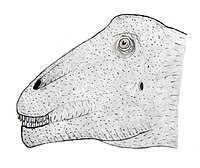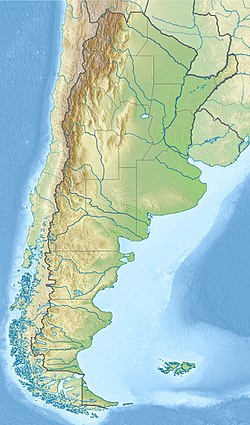Bajo de la Carpa Formation
| Bajo de la Carpa Formation | |
|---|---|
| Stratigraphic range: Mid-Late Santonian ~ | |
 Juan D. Porfiri excavating the holotype of Diuqin lechiguanae from the Bajo de la Carpa Formation | |
| Type | Geological formation |
| Unit of | Neuquén Group Río Colorado Subgroup |
| Underlies | Anacleto Formation |
| Overlies | Río Neuquén Subgroup Plottier Formation |
| Thickness | Up to 150 m (490 ft) |
| Lithology | |
| Primary | Sandstone |
| Other | Mudstone, siltstone, paleosol |
| Location | |
| Coordinates | 38°48′S 68°48′W / 38.8°S 68.8°W |
| Approximate paleocoordinates | 43°24′S 49°48′W / 43.4°S 49.8°W |
| Region | Neuquén & Río Negro Provinces |
| Country | Argentina |
| Extent | Neuquén Basin |
The Bajo de la Carpa Formation is a geologic formation of the Neuquén Basin that crops out in northern Patagonia, in the provinces of Río Negro and Neuquén, Argentina. It is the oldest of two formations belonging to the Río Colorado Subgroup within the Neuquén Group. Formerly, that subgroup was treated as a formation, and the Bajo de la Carpa Formation was known as the Bajo de la Carpa Member.[1]
At its base, this formation conformably overlies the Plottier Formation of the older Río Neuquén Subgroup, and it is in turn overlain by the Anacleto Formation, the youngest and uppermost formation of the Neuquén Group.[2][3]
The Bajo de la Carpa Formation can reach 150 metres (490 ft) in thickness in some locations, and consists mainly of sandstones of various colors, all of fluvial origin, with thin layers of mudstone and siltstone in between. Geological features such as geodes, chemical nodules, impressions of raindrops, and paleosols (fossil soils) are commonly found in this formation as well.[1][3]
Fossil content
[edit]Reptiles
[edit]| Reptiles reported from the Bajo de la Carpa Formation | ||||||
|---|---|---|---|---|---|---|
| Genus | Species | Location | Stratigraphic position | Material | Notes | Images |
| Lomalatachelys[4] | L. neuquina | A snake-necked turtle | ||||
| Dinilysia | D. patagonica | A Snake | ||||
| Paleochelco[5] | P. occultato | A lizard | ||||
| Podocnemidoidea[6] | Indeterminate. | |||||
Small nests with eggs inside, found in this formation, probably belonged to the bird Neuquenornis.[3] Fossil wasp nests have also been found in these rocks.[1][3]
Crocodylomorphs
[edit]| Crocodylomorphs reported from the Bajo de la Carpa Formation | ||||||
|---|---|---|---|---|---|---|
| Genus | Species | Location | Stratigraphic position | Material | Notes | Images |
| Barrosasuchus | B. neuquenianus[7] | |||||
| Comahuesuchus | C. brachybuccalis |  | ||||
| Cynodontosuchus | C. rothi | |||||
| Lomasuchus | L. palpebrosus. | |||||
| Gasparinisuchus[8] | G. peirosauroides | |||||
| Kinesuchus | K. overoi[9] | |||||
| Neuquensuchus | N. universitas [10] | |||||
| Notosuchus | N. lepidus |  | ||||
| N. terrestris | ||||||
| Peirosaurus | P. torminni | A fragmentary skull and a partial postcranial skeleton. | ||||
Fish
[edit]| Fish reported from the Bajo de la Carpa Formation | ||||||
|---|---|---|---|---|---|---|
| Genus | Species | Location | Stratigraphic position | Material | Notes | Images |
| Rinconodus[11] | R. salvadori | A ceratodontid lungfish | ||||
Dinosaurs
[edit]Ornithischians
[edit]| Ornithischians reported from the Bajo de la Carpa Formation | ||||||
|---|---|---|---|---|---|---|
| Genus | Species | Location | Stratigraphic position | Material | Notes | Images |
| Ankylosauria[12] | Indetermidate. | |||||
| Mahuidacursor[13] | M. lipanglef | An ornithopod. | ||||
Sauropods
[edit]| Sauropods reported from the Bajo de la Carpa Formation | ||||||
|---|---|---|---|---|---|---|
| Genus | Species | Location | Stratigraphic position | Material | Notes | Images |
| Bonitasaura | B. salgadoi | A partial sub-adult skeleton with a lower jaw, a partial vertebrae series, and limb bones. | A titanosaur. |  | ||
| Inawentu | I. oslatus | Rincón de los Sauces. | A partially articulated skeleton, including a nearly complete skull, Several vertebrae from the atlas to the end of the sacrum, and both ilia | A titanosaur. |  | |
| Overosaurus | O. paradasorum | Upper | A fully articulated vertebral series consists of rib bones, dorsals, and ilium. | A titanosaur. |  | |
| Rinconsaurus | R. caudamirus | Rincón de los Sauces. | Lower. | The fossil remains included vertebrae, limb bones, scapula, hip bones (pubis, ilium, and ischium) and several ribs. | A titanosaur. |  |
| Traukutitan[14] | T. eocaudata | Sitio Trauku. | Lower | A partial semi-articulated skeleton including both thigh bones and thirteen vertebrae from the anterior and middle tail. | A titanosaur. | |
Theropods
[edit]| Theropods reported from the Bajo de la Carpa Formation | ||||||
|---|---|---|---|---|---|---|
| Genus | Species | Location | Stratigraphic position | Material | Notes | Images |
| Achillesaurus | A. manazzonei | Upper | A partial skeleton consists of a sacral vertebra, four tail vertebrae, part of the left thighbone, shin, and foot, and the left ilium. | An alvarezsaurid. |  | |
| Alvarezsaurus | A. calvoi | An alvarezsaurid. |  | |||
| Diuqin[15] | D. lechiguanae | "the isthmus between the southeast coast of Lago Barreales and the northwest coast of Lago Mari Menuco" | A fragmentary but associated partial skeleton | An unenlagiine. |  | |
| Llukalkan [16] | L. aliocranianus | La Invernada site. | A partial skull. | An abelisaur. | ||
| Neuquenornis[3] | N. volans | Upper | A skull and a partial postcranial remains. | A enantiornithine bird. | ||
| Patagopteryx | P. eferrariisi | Upper | The oldest known flightless bird. |  | ||
| Tratayenia[17] | T. rosalesi | A well-preserved partial skeleton | A megaraptoran theropod. |  | ||
| Velocisaurus[16] | V. unicus | A noasaur. | ||||
| Viavenator[16] | V. exxoni | An abelisaur. |  | |||
See also
[edit]- List of fossil sites
- List of dinosaur bearing rock formations
- Mata Amarilla Formation, contemporaneous formation of the Austral Basin
References
[edit]- ^ a b c Sánchez et al., 2006
- ^ Fossa Mancini et al., 1938
- ^ a b c d e Leanza et al., 2004
- ^ F. d.e. Lapparent de Broin and M. S. de la Fuente. 2001. Oldest world Chelidae (Chelonii, Pleurodira), from the Cretaceous of Patagonia, Argentina. C. R. Acad. Sci. Paris, Sciences de la Terre et des planètes 333:463-470.
- ^ Martinelli, Agustín Guillermo; Agnolin, Federico; Ezcurra, Martin (2021-07-26). "Unexpected new lizard from the Late Cretaceous of southern South America sheds light on Gondwanan squamate diversity". Revista del Museo Argentino de Ciencias Naturales. Nueva Serie. 23 (1): 57–80. doi:10.22179/revmacn.23.716. hdl:11336/167951. ISSN 1853-0400. S2CID 243557642.
- ^ Maniel, I. J. (2024). "Pelomedusoid turtles from the Bajo de la Carpa Formation (Santonian, Upper Cretaceous), Río Negro Province, Patagonia, Argentina". Ameghiniana. 61 (3): 138–147. doi:10.5710/AMGH.12.06.2024.3591.
- ^ Coria et al., 2019
- ^ Martinelli et al., 2012
- ^ Filippi et al., 2018a
- ^ Lio et al., 2018
- ^ Panzeri, K. M.; Gouiric Cavalli, S.; Cione, A. L.; Filippi, L. S. (2022). "Description of the first Cretaceous (Santonian) articulated skeletal lungfish remains from South America, Argentina". Comptes Rendus Palevol. 21 (37): 815–835. doi:10.5852/cr-palevol2022v21a37. S2CID 253034856.
- ^ Rozadilla, Sebastián; Agnolín, Federico; Manabe, Makoto; Tsuihiji, Takanobu; Novas, Fernando E. (September 2021). "Ornithischian remains from the Chorrillo Formation (Upper Cretaceous), southern Patagonia, Argentina, and their implications on ornithischian paleobiogeography in the Southern Hemisphere". Cretaceous Research. 125: 104881. Bibcode:2021CrRes.12504881R. doi:10.1016/j.cretres.2021.104881. ISSN 0195-6671.
- ^ Cruzado Caballero et al., 2019
- ^ Filippi, Leonardo S.; Juárez Valieri, Rubén D.; Gallina, Pablo A.; Méndez, Ariel H.; Gianechini, Federico A.; Garrido, Alberto C. (2023). "A rebbachisaurid-mimicking titanosaur and evidence of a Late Cretaceous faunal disturbance event in South-West Gondwana". Cretaceous Research. 154. doi:10.1016/j.cretres.2023.105754. ISSN 0195-6671.
- ^ Porfiri, Juan D.; Baiano, Mattia A.; dos Santos, Domenica D.; Gianechini, Federico A.; Pittman, Michael; Lamanna, Matthew C. (2024-06-14). "Diuqin lechiguanae gen. et sp. nov., a new unenlagiine (Theropoda: Paraves) from the Bajo de la Carpa Formation (Neuquén Group, Upper Cretaceous) of Neuquén Province, Patagonia, Argentina". BMC Ecology and Evolution. 24 (1): 77. Bibcode:2024BMCEE..24...77P. doi:10.1186/s12862-024-02247-w. ISSN 2730-7182. PMC 11177497. PMID 38872101.
- ^ a b c Filippi et al., 2018b
- ^ Porfiri et al., 2018
Bibliography
[edit]- Coria, Rodolfo A.; Ortega, Francisco; Arcucci, Andrea B.; Currie, Philip J. (2019). "A new and complete peirosaurid (Crocodyliformes, Notosuchia) from Sierra Barrosa (Santonian, Upper Cretaceous) of the Neuquén Basin, Argentina". Cretaceous Research. 95: 89–105. Bibcode:2019CrRes..95...89C. doi:10.1016/j.cretres.2018.11.008. S2CID 133671689.
- Cruzado Caballero, P.; Gasca, J.M.; Filippi, L.S.; Cerda, I.; Garrido, A.C. (2019). "A new ornithopod dinosaur from the Santonian of Northern Patagonia (Rincón de los Sauces, Argentina)". Cretaceous Research. 98: 211–229. Bibcode:2019CrRes..98..211C. doi:10.1016/j.cretres.2019.02.014. S2CID 133830733.
- Filippi, L.S.; Barrios, F.; Garrido, A.C. (2018a). "A new peirosaurid from the Bajo de la Carpa Formation (Upper Cretaceous, Santonian) of Cerro Overo, Neuquén, Argentina". Cretaceous Research. 83: 75–83. Bibcode:2018CrRes..83...75F. doi:10.1016/j.cretres.2017.10.021. hdl:11336/97117. Retrieved 2019-02-21.
- Filippi, Leonardo S.; Méndez, Ariel H.; Gianechini, Federico A.; Juárez Valieri, Rubén D.; Garrido, Alberto C. (2018). "Osteology of Viavenator exxoni (Abelisauridae; Furileusauria) from the Bajo de la Carpa Formation, NW Patagonia, Argentina". Cretaceous Research. 83: 95–119. Bibcode:2018CrRes..83...95F. doi:10.1016/j.cretres.2017.07.019. hdl:11336/75315. Retrieved 2019-02-21.
- Fossa Mancini, E.; Feruglio, E.; Yussen de Campana, J.C. (1938). "Una reunión de geólogos de YPF y el problema de la terminología estratigráfica ("A YPF geologists' reunion and the problem of stratigraphy terminology")". Boletín de Informaciones Petroleras. 15: 1–67.
- Leanza, H.A.; Apesteguia, S.; Novas, F.E.; De la Fuente, M.S. (2004). "Cretaceous terrestrial beds from the Neuquén Basin (Argentina) and their tetrapod assemblages". Cretaceous Research. 25 (1): 61–87. Bibcode:2004CrRes..25...61L. doi:10.1016/j.cretres.2003.10.005. Retrieved 2019-02-16.
- Lio, Gabriel; Agnolin, Federico L.; Martinelli, Agustín G.; Ezcurra, Martín D.; Novas, Fernando E. (2018). "New specimen of the enigmatic, Late Cretaceous crocodyliform Neuquensuchus universitas sheds light on the anatomy of the species". Cretaceous Research. 83: 62–74. Bibcode:2018CrRes..83...62L. doi:10.1016/j.cretres.2017.09.014. hdl:11336/94889. Retrieved 2019-02-21.
- Martinelli, Agustín G.; Sertich, Joseph J.W.; Garrido, Alberto C.; Praderio, Ángel M. (2012). "A new peirosaurid from the Upper Cretaceous of Argentina: Implications for specimens referred to Peirosaurus torminni Price (Crocodyliformes: Peirosauridae)". Cretaceous Research. 37: 191–200. Bibcode:2012CrRes..37..191M. doi:10.1016/j.cretres.2012.03.017. Retrieved 2019-02-21.
- Porfiri, Juan D.; Juárez Valieri, Rubén D.; Santos, Domenica D.D.; Lamanna, Matthew C. (2018). "A new megaraptoran theropod dinosaur from the Upper Cretaceous Bajo de la Carpa Formation of northwestern Patagonia". Cretaceous Research. 89: 302–319. Bibcode:2018CrRes..89..302P. doi:10.1016/j.cretres.2018.03.014. S2CID 134117648. Retrieved 2019-02-21.
- Sánchez, María Lidia; Heredia, Susana; Calvo, Jorge O. (2006). "Paleoambientes sedimentarios del Cretácico Superior de la Formación Plottier (Grupo Neuquén), Departamento Confluencia, Neuquén (Sedimentary paleoenvironments in the Upper Cretaceous Plottier Formation (Neuquen Group), Confluencia, Neuquén)". Revista de la Asociación Geológica Argentina. 61: 3–18. Retrieved 2019-02-16.
- Gianechini, Federico A.; Méndez, Ariel H.; Filippi, Leonardo S.; Paulina-Carabajal, Ariana; Juárez-Valieri, Rubén D.; Garrido, Alberto C. (2021). "A New Furileusaurian Abelisaurid from La Invernada (Upper Cretaceous, Santonian, Bajo De La Carpa Formation), Northern Patagonia, Argentina". Journal of Vertebrate Paleontology. 40 (6): e1877151. doi:10.1080/02724634.2020.1877151.
Further reading
[edit]- Leardi, Juan Martín; Pol, Diego; Brandoni de Gasparini, Zulma (2018). "New Patagonian baurusuchids (Crocodylomorpha; Notosuchia) from the Bajo de la Carpa Formation (Upper Cretaceous; Neuquén, Argentina): New evidences of the early sebecosuchian diversification in Gondwana". Comptes Rendus Palevol. 17 (8): 504–521. Bibcode:2018CRPal..17..504L. doi:10.1016/j.crpv.2018.02.002. hdl:11336/98526. S2CID 134148996. Retrieved 2019-02-21.

